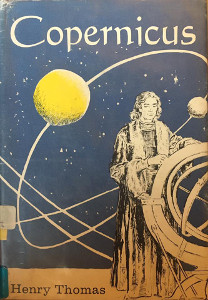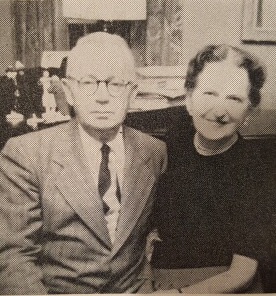Copernicus

Author:
Henry Thomas
Publication:
1960 by Julian Messner, Inc.
Genre:
Biography, Math, Non-fiction, Science
Series:
Messner Shelf of Biographies (World History)
Pages:
192
Current state:
This book has been evaluated and information added. It has not been read and content considerations may not be complete.
Book Guide
Search for this book used on:
Regarded as the founder of modern astronomy, Copernicus was one of the most versatile geniuses of the sixteenth century—astronomer, physician, churchman, soldier and philosopher. He defied the thinkers of his day and inspired one of the greatest revolutions in human thought. Overthrowing the age-old belief that the earth was fixed at the center of the universe, he established the theory that the earth rotates daily on its axis and the planets revolve in orbits around the sun.
As a boy in Poland, Copernicus was torn with pity for the sufferings of mankind. To help humanity, he decided to study both medicine and religion and was educated at Polish and Italian universities, but his primary interest was astronomy. His research convinced him that the earth moved around the sun and that a single universal law accounted for the motion of all heavenly bodies. These theories refuted established superstition and were dangerous, for Copernicus lived in the dreaded shadow of the Inquisition. Men were not allowed to think for themselves; if judged a heretic or atheist he could be burned to death or buried alive. Prudently, he decided not to express his views until he could prove them, and he began to work on his book which took thirty dedicated years.
Copernicus practiced medicine and also served as a church official, but with Reformation, religious war spread like a vast bloodstain and his pleas for tolerance were futile. He was ridiculed as "the crazy astronomer", yet respected as a physician even by his enemies. Quietly he continued his work until Poland was invaded by the Teutonic Knights, a Nazi-like horde determined to establish "Nordic supremacy". Copernicus was their principal target, to be burned at the stake. But he prepared the defense of Allenstein Castle and resisted months of brutal siege.
Henry Thomas brings to life the savage splendor of the Renaissance. We meet the martyred prophet Savanarola, who was Copernicus' hero and Michelangelo, who was his friend. Most dramatically, we enter the heart of a modest and lonely man who pioneered the mysteries of outer space. Isaac Newton wrote, more than a century later, "If I have been farther, it is by standing on the shoulders of the giants."
From the book
To view an example page please sign in.
To view awards and booklists please sign in.
Content Guide
Please sign in to access all of the topics associated with this book and view other books with the same topics.
Please sign in to access the locations this book takes place in and view other books in the same location.
Please sign in to access the time periods this book takes place in and view other books in the same time period.
For information about the lead characters please sign in.
Find This Book
Search for this book used on:


